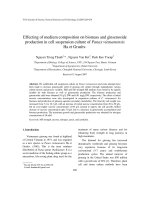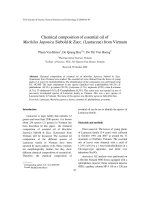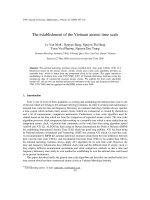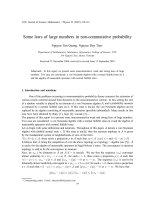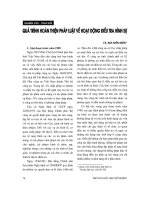Tài liệu Báo cáo " Chemical composition of essential oil of Machilus Japonica Siebold & Zucc. (Lauraceae) from Vietnam " pptx
Bạn đang xem bản rút gọn của tài liệu. Xem và tải ngay bản đầy đủ của tài liệu tại đây (113.27 KB, 3 trang )
VNU Journal of Science, Natural Sciences and Technology 25 (2009) 81-83
81
Chemical composition of essential oil of
Machilus Japonica Siebold & Zucc. (Lauraceae) from Vietnam
Pham Van Khien
1
, Do Quang Huy
2,
*, Do Thi Viet Huong
2
1
Pharmaceutical Journal, Vietnam
2
College of Science, VNU, 334 Nguyen Trai, Hanoi, Vietnam
Received 29 October 2008
Abstract. Chemical composition of essential oil of Machilus Japonica Siebold & Zucc.
(Lauraceae) from Vietnam were studied. The essential oil were obtained from the leaves of young
plants (3-4 years) by hydrodistillation. The identification of the components was performed using
GC, GC/MS. The main components in this species identified were α-phellandrene (60.2%), β-
phellandrene (10.5%), p-cymene (20.3%), β-myrcene (3.7%), terpineole (0.9%), trans-β-ocimene
(0.7%), 11-dodecenol (0.3), β-Caryophyllene (0,5%). This result were not reported in any of
previously investigated species of Lauraceae family in Vietnam. This was a new species of
Lauraceae family in Vietnam. The name of this species was Machilus japonica Siebold & Zucc.
Keywords: Lauraceae; Machilus japonica; leaves; essential oil; phellandrene; p-cymene.
Introduction
∗
∗∗
∗
Lauraceae is lager family that includes 32
genera and more than 2500 species. it is known
about 256 species (21 genera) in Vietnam has
been described. In this paper, the chemical
composition of essential oil of Machilus
Japonica Siebold & Zucc. (Lauraceae) from
Vietnam will be discussed. The essential oil
composition of the different species of
Lauraceae family in Vietnam have been
reported by many authors [1-8]. These varieties
are morphologically similar, but they show
different chemical compositions of essential oil.
Therefore, the chemical composition of
_______
∗
Corresponding author. Tel.: 84-4-8583905
E-mail:
essential oil can be use to identify the species of
Lauraceae family.
Materials and methods
Plant material. The leaves of young plants
of Lauraceae family (3-4 years) were collected
in October 1991 and 2007 at around Ba Vi
mountain, in Northern Vietnam. The essential
oils of leaves were obtained with a yield of
1.23% (w/w) by a 1 hour hydrodistillation in a
Clevenger-type apparatus, and dried over
anhydrous Na
2
SO
4
.
Analytical. GC analysis were performed on
a Hewlett Packard 5890 Series equipped with a
split/splitless injector; flame ionization detector
(FID); capillary column HP-5 (30 m x 320 µm
P.V. Khien et al. / VNU Journal of Science, Natural Sciences and Technology 25 (2009) 81-83
82
i.d., film thickness 0.25 µm); column
temperature, 60
o
C for 3 min, 5
o
C/min to 230
o
C
and kept at 230
o
C for 10 min; injector
temperature 250
o
C; split ratio 1:40; detector
temperature 260
o
C; carrier gas N2 0.9 ml/min;
volume injected 1 µL. GC/MS analysis was
performed on a Hewlett Packard 5890 Series
equipped with HP5971A mass selective
detector; capillary column HP-5MS (30 m x
250 µm i.d., film thickness 0.25 µm); column
temperature, 60
o
C for 3 min, 5
o
C/min to 230
o
C
and kept at 230
o
C for 10 min; injector
temperature 250
o
C; split ratio 1:50; detector
temperature 260
o
C; carrier gas He 0.9 ml/min;
volume injected 1µL; interface temperature
280ºC; acquisition mass range 40-400.
Identification of the constituents of essential oil
was made by comparison of their mass spectra
with nbs75l library spectra data. Relative
percentage amounts were calculated from FID
peak areas [9-12].
Results and discussion
The essential oil was light yellow and the
total yield of 1.23%. The chemical composition
of the leaf essential oils of investigated species
collected in October 1991 and 2007 were not
different and included 18 components (table 1).
As it is shown in table 1, the leaf essential oil of
investigated species from Vietnam was
characterized by large amount of α- and β-
phellandrene (70.7%) and the ratio of α-
phellandrene and β-phellandrene was 5.73.
Table 1. The composition of leaf essential oil of
Machilus japonica Siebold & Zucc. (Lauraceae)
fromVietnam
Peak Identification KI Percent
1
α-Thujene
931 trace
2
α-Pinene
939 0.2
3 Sabinene 976 trace
4
β-Pinene
980 trace
5
β-Myrcene
990 3.7
6
α-Phellandrene
1006 60.2
7 p-Cymene 1028 20.3
8
β-Phellandrene
1031 10.5
9
cis−β-Ocimene
1042 0.2
10
trans−β-Ocimene
1053 0.7
11 Linalool 1100 trace
12 Camphor 1145 trace
13
α-Terpineol
1189 0.9
14
α-Phellandrene ocide
1192 0.1
15
(Z)−β-Carvotancetol
1210 0.1
16 11-Dodecenol 1369 0.3
17 Carvarol 1371 0.2
18
β-Caryophyllene
1414 0.5
Total 97.8
The main components in the leaf essential
oil were α-phellandrene (60.2%), β-
phellandrene (10.5%), p-cymene (20.3%).
Other notable constituents were β-myrcene
(3.7%), α-terpineol (0.9%), trans-β-ocimen
(0.7%), 11-Dodecenol (0.3), β-Caryophyllene
(0,5%). The high content of α-phellandrene, β-
phellandrene and p-cymene were detected in the
leaf essential oil, which were not reported in
any of previously investigated species of
Lauraceae family in Vietnam. To the best of our
knowledge, this was a new species of Lauraceae
family in Vietnam. The name of this species
was Machilus japonica Siebold & Zucc.
Acknowledgements
The authors are grateful for financial
support by National project for base research
from the Ministry of Science and Technology
of Vietnam, code 50 63 06.
References
[1] N.X. Dung, P.V. Khien, Essential oils of wood,
root, flower, and fruit of camphor tree,
Pharmaceutical Journal, No.6, (1991) 8.
P.V. Khien et al. / VNU Journal of Science, Natural Sciences and Technology 25 (2009) 1-3
83
[2] N.X. Dung, P.V. Khien, H.T. Chien, P.A. Leclercq,
The essential oil of Cinnamomum camphora (L.)
Sieb. var. linaloolifera from Vietnam, J. Essent.
Oil Res., 5 (1993) 451.
[3] Nguyen Xuan Dung, Do Quang Huy, Pham Van
Khien, etc, Pharmaceutical Journal, No.4,
(1988) 13.
[4] Hoang Hai Hiên, Le Thi Mai Hoa, Tran Dinh
Thang, Nguyen Xuan Dung, Some results of the
study on Lauraceae Species from Vietnam,
Proceeding of The 9th International Congress
on Ethnopharmacology, Nanning, China, 22-
26/8/2006.
[5] Tran Dinh Thang, Do Ngoc Dai, Do Quang Huy,
Nguyen Xuan Dung, A new natural source of
Camphor from Cinnamomum longepetiolatum
Costerm. apud Phamh. in Vietnam, VNU Journal
of Science, Nat., Sci., & Tech.(Vietnam), 2008
(accepted).
[6] Tran Dinh Thang, Do Ngoc Dai, Do Quang Huy,
Nguyen Xuan Dung, Chemical composition of
the leaf oil of Cinnamomum ovatum Allen from
Vietnam, Pharmaceutical Journal, Vol.13, No.2,
(2008) 94.
[7] Tran Dinh Thang, Hoang Hai Hien, Trinh Xuan
Thuy, Nguyen Xuan Dung, Volatile Constituents
of the Leaf Oil of Litsea euosma J. J. Sm. from
Vietnam, Journal of Essential Oil Bearing
Plants, Vol.9, No.2 (2006) 122.
[8] Nguyen Hoang Anh, Helmut Ripperger, Tran
Van Sung, Guenter Adam, Neolignans and a
sesquiterpene from Caryodaphnosis tonkinensis,
Phytochemistry, 42 (4) (1996) 1167.
[9] L. Zhu, D. Ding, B. M. Lawrence, The
cinnamomum species in China: resouces for the
present and future, Perfumer and Flavorist, 19
(1994) 17.
[10] R.P. Adams, Identification of Essential Oil
Components by Gas Chromatography/
Quadrupole Mass Spectrometry, Allured
Publising Corp. Carol Stream, IL., 2001.
[11] Yoshida, T., Muraki, S. and Komatsu, A Minor
Constituents of Japanese Ho-Leaf Oil. Agr. Biol.
Chem. 33 (1969) 343.
[12] National Sun Yat-Sun University, A systematic
study on the genus Machilus of Taiwan
(Lauraceae), 1997.
Thành phần hóa học của tinh dầu cây Machilus Japonica
Siebold & Zucc. (Lauraceae) ở Việt Nam
Phạm Văn Khiển
1
, ðỗ Quang Huy
2
, ðỗ Thị Việt Hương
2
1
Tạp chí Dược học
2
Trường ðại học Khoa học Tự nhiên, ðHQGHN, 334 Nguyễn Trãi, Hà Nội, Việt Nam
Thành phần hóa học của cây Machilus Japonica Siebold & Zucc. (Lauraceae) ở Việt Nam ñã ñược
nghiên cứu. Tinh dầu thu ñược từ lá cây 3-4 năm tuổi bằng phương pháp cất lôi cuốn hơi nước. Thành
phần hóa học của tinh dầu ñược xác ñịnh bằng phương pháp sắc ký khí và sắc ký khí khối phổ. Thành
phần chất chính có mặt trong tinh dầu là α-phellandrene (60,2%), β-phellandrene (10,5%), p-cymene
(20,3%), β-myrcene (3,7%), terpineole (0,9%), trans-β-ocimene (0,7%), 11-dodecenol (0,3), β-
Caryophyllene (0,5%). Thành phần tinh dầu của loài cây lấy nghiên cứu chưa thấy có trong các công
trình công bố trước ñây ở Việt Nam. Kết quả nghiên cứu ñã chỉ ra rằng ñây là loài thuộc họ Lauraceae
và có tên khoa học là Machilus japonica Siebold & Zucc.

